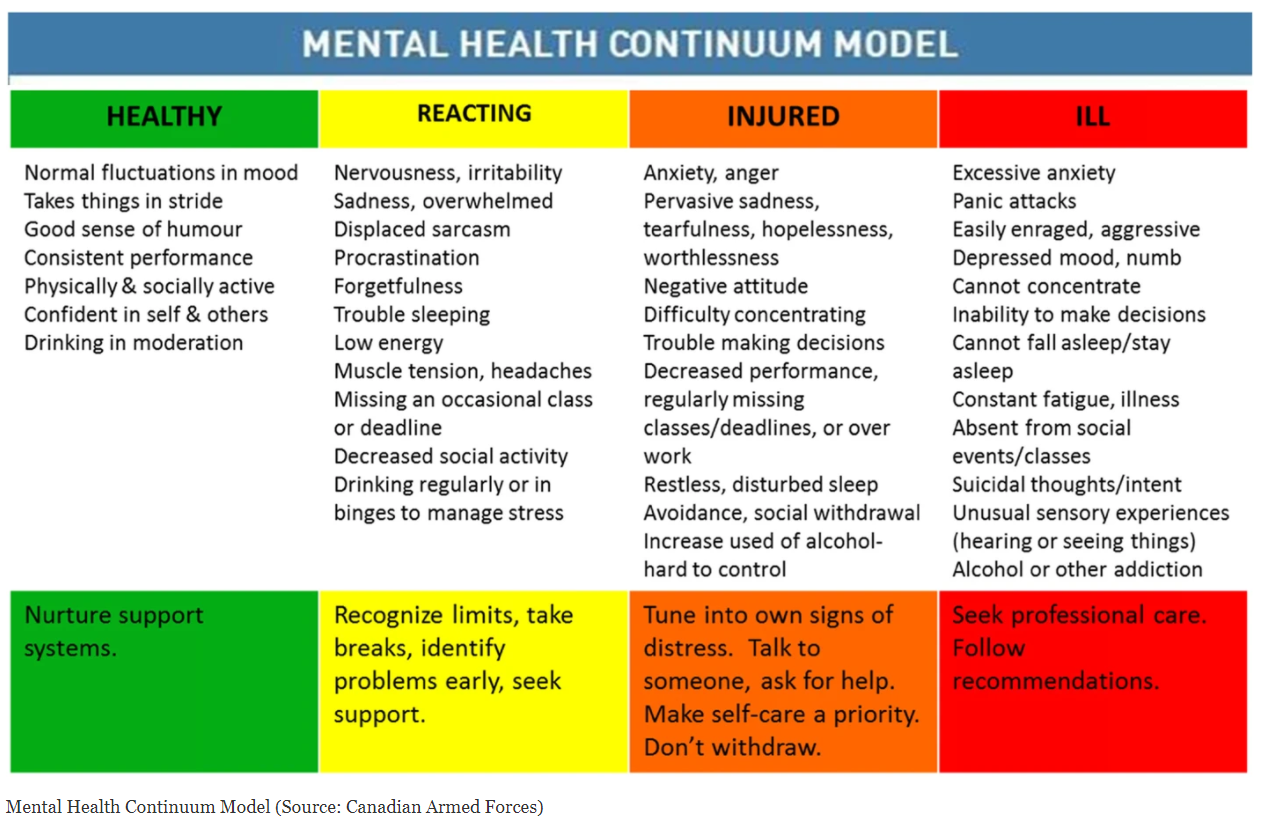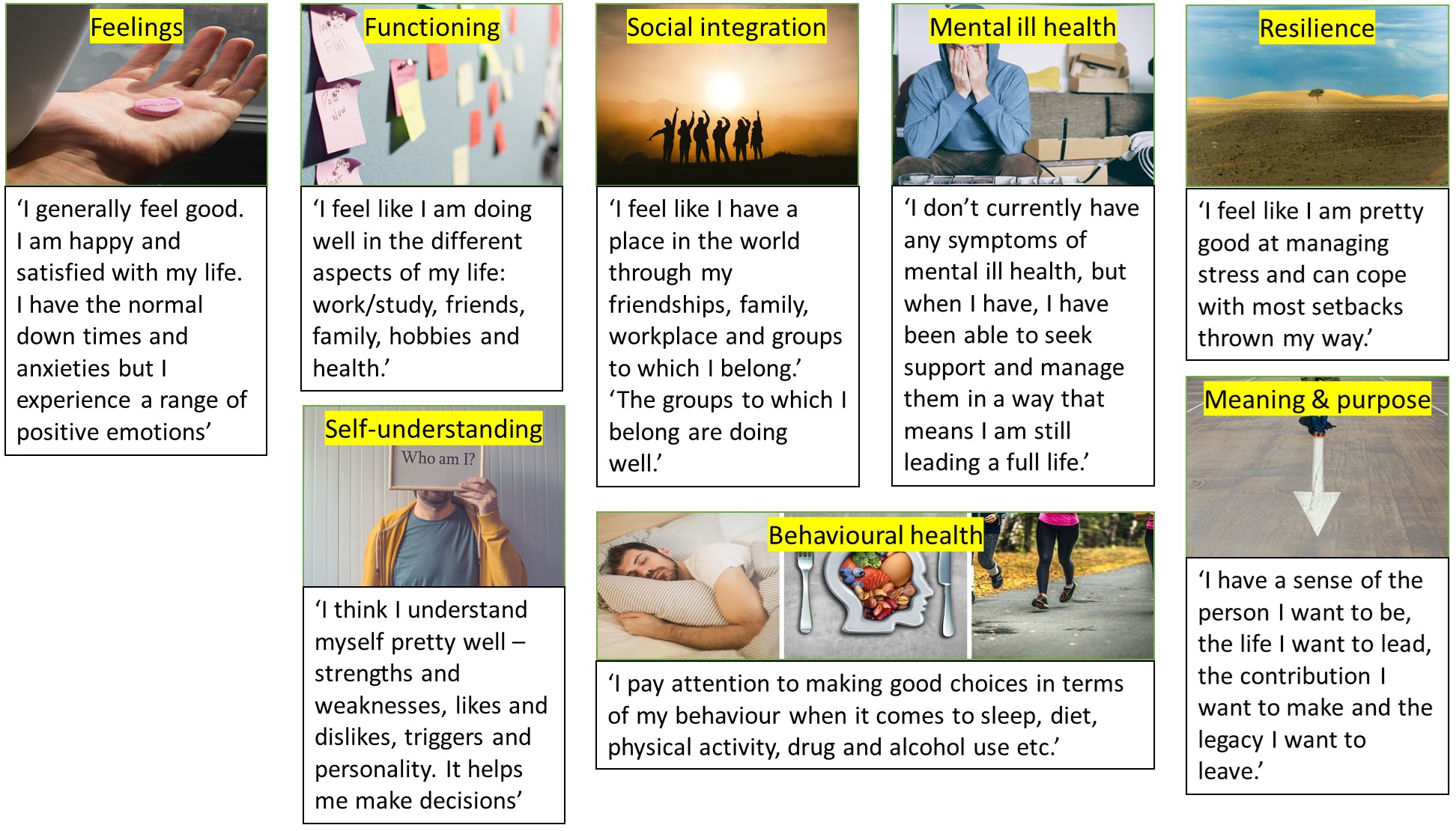
Last week was a crazy busy week. This week is turning out the same to be honest 😫.
The bulk of last week was taken up with preparation for a small conference presentation I gave on Friday 30/1/21. I was speaking to physiotherapy educators, the ones who support and coach students through their clinical placements prior to graduation.
The essence of the presentation was how to better support the mental health of students during clinical placements, which as any allied health student knows, are one of the more psychologically challenging periods during training
Part of what we talked about was the definition of mental health.
What I tried to do (not sure if successful) was communicate that mental health isn’t a single continuum as it continues to be described where you have healthy on one end, and ill on the other. For example,

Rather it is a parallel but interrelated set of domains, all of which contribute to one’s overall mental health. This isn’t a controversial view as far as I can tell. The WHO definition itself contains multiple relevant domains when discussing mental health.
‘Mental health is a state of well-being in which an individual realizes his or her own abilities, can cope with the normal stresses of life, can work productively and is able to make a contribution to his or her community.’
I like to follow the presentation of the WHO definition with a discussion of the domains I think are relevant when discussing mental health:
So what are those domains?
I currently outline 8 when talking about mental health. They are summarised in the diagram and in text below.

Feelings/mood
This domain refers to one’s overall emotional temperature. How has a person been feeling today, this week, this month? It is normal and expected that moods and feelings will fluctuate naturally over time, but in good mental health we generally see strong representation from positive, pleasant, desirable emotions: happiness, joy, curiosity, calm etc.
Functioning
This refers to an individuals’ subjective assessment of how they are doing in the different areas of their life: work, family, friends, hobbies, health. Mental health is higher when one feels successful in the different domains of their life. Sometimes good functioning in one domain of a person’s life (e.g. work) can help buffer against not so great functioning in another domain (e.g. family).
Social integration
A sense of belonging that comes from having a place (or multiple places) in the world. Feeling part of a family, a group of friends, a workplace, a community. It is about having supportive relationships and being able to give and receive love and care.
Mental ill health
It is difficult to live a life without being touched by mental ill health in some way. Thus, rather than the complete absence of mental ill health, in this domain we are talking about the extent to which an individual experiences and is able to manage any symptoms of mental ill health.
Resilience
Is the perception that one has that they can cope with setbacks, bounce back after failure or mistakes, cope with stress, and navigate their way through difficult times. Resilience is influenced by the psychological, social and physical resources that one has to draw on, and the extent of the challenges they face.
Self-understanding
This is the degree to which an individual has a good sense of who they are (e.g. likes, dislikes, strengths, weaknesses), accepts these, and can use this understanding to make decisions and choices that enhance their lives.
Meaning & purpose
A sense of knowing one’s purpose, the kind of person you want to be, the life you want to lead, the contribution you want to make, the legacy you want to leave. It isn’t the ‘meaning of life’, but rather what the individual thinks is the meaning of their life. It is closely tied to the quality of the connections a person has to their ancestry, land, spirituality, culture and community.
Behavioural health
The extent to which one is making lifestyle choices (sleep, diet, physical activity, drug and alcohol use etc) that support good physical and mental health.
Implications
Thinking about mental health as consisting of interrelated domains has a few implications.
First, poor functioning in one domain doesn’t necessarily negate good functioning in others. Yes, these domains are interrelated and movement on one domain will influence others, but it is possible to build overall mental health whilst still struggling in certain domains.
A multiple domain approach can help understand why someone might appear to be successful in multiple areas (work, resilience, lifestyle) but still report there being ‘something missing’. It could be that they lack meaning or strong social connections and those domains have a strong weighting in their overall mental health.
This way of looking at mental health means there are many ways to invest in one’s mental health. A person could invest time and effort in working on mood, functioning, social, ill health, lifestyle, stress management, self-understanding or meaning and purpose. All of these areas can respond positively to deliberate and intentional efforts on the part of the person. There is some choice in one’s personal development efforts.
When it comes to helping someone with their mental health….
Thinking back to the presentation I gave to the physiotherapy educators, something which I didn’t communicate well was a simple way of thinking about how to help someone improve their mental health.
With this domain model in mind, you could say that helping someone with their mental health involves one or more of the following:
- Make them feel better
- Help them function better
- Help them feel part of a group
- Help them manage symptoms of mental ill health
- Help them cope during a difficult time
- Help them understand themselves better
- Help them discover their meaning and purpose
- Help them establish a healthy lifestyle
I hope this helps you think about how you could support someone with their mental health. In future posts, I will try looking at the actual things you could do in each of these 8 areas.
PS – If you’d like a more poetic look at ‘what is mental health’, I like this video from School of Life


Brilliant – clear and helpful for folk who don’t have a background in mental health. Thanks Gareth.
Thanks Nicky – much appreciated 🙂